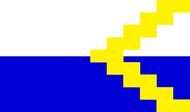Baltian Collective Security Alliance
The Baltian Collective Security Alliance (BCSA) (Russian: Балтийский Коллективной Безопасности Альянс, Ukrainian: Балтійська Колективної Безпеки Альянсу, Cheslovian: Балтискаи Всйо Кинв Организийер) is an alliance between between Baltian countries who have signed an agreement (The Treaty of Serov) declaring their intentions to support each other in times of war or crisis, the BCSA also supports the allies of individual member states (such as its role in the Somplenese-Molossian War), and also serves the purpose of protecting the Baltian Sector.It was founded on 20 September 2008.
Member states
History
Originally established as a military alliance, the BCSA has progressed into a de facto single military force. The alliance was established by the signing of the Treaty of Serov, an agreement officialising the compulsory support a member state must give to another member state in times of war or crisis. The organisation created its official flag on the 23rd June 2009, causing a controversy in Cheslovia, many people viewed the creation of a flag as a sign of "greater integration towards a single armed force". The government of Cheslovia states that integration towards a single armed force is a false hypothesis. During the Second Baltian War the Federation of Seldov-Volodovkaya was expelled, it was later classified by the BCSA as a micronational terrorist organisation attempting to destroy the BCSa and its member states
Training
Troops participating in the BCSA train a minimum of once every week, they train using modern KDI guerrilla tactics and train to fight on familiar terrain.
Somplenese-Molossian War
On 7 March 2009, the BCSA had stated that it would support the Republic of Molossia in its war with Somple. On the 8th March 2009 a meeting will be held (Known as the S-M War Conference, Musorov) to discuss the war and how to resolve it and the possibilities of the inclusion of the NAFM into the war.
The S-M War Conference, Musorov was canceled in the morning of 8 March 2009 after seeing the war had come to a halt.
Defence meetings
The BCSA regularly holds defence meetings to discuss issues which may concern Baltia and Baltian micronations, past defence meetings (and their topics) include:
3 January Meeting (Baltian Defence Summit 2009)
- Threat evaluation of the Izkar Confederacy
- Possible military deployment inside Izkaria.
- Other forms of action against the Izkar Confederacy
8 January Meeting (2nd Baltian Defence Summit 2009)
- Threat evaluation of the Baugnians
- Action plan to combat Baugnian threat
- Peace deal with Izkaria to combat threat to Baltia as a whole
15 June Meeting (Musorov Defence Conference 2009)
- Ud Mahazar and BCSA
- Ud Mahazar weapons purchasing
- Establishment of a "Baltian Defence Zone" and the "Baltian Protection Areas"
5 - 10 October Meeting (Chuchevich War Summit 2009)
- The increasing hostility of the CBS, Andyria and other rogue Baltian nations
- Potential symathy tactics for use in the Cheslovian November Elections
- How to bring about a swift end to the war
BCSA Armoury
The BCSA has established five armouries in Cheslovia to hold defence equipment:
- New Cheslovia Armoury
- Milna Armoury
- Transylvakia Armoury
- Estovakia Armoury
- Valdisia Armoury
BCSA Rocket Defence Enhancement Project
The BCSA Rocket Defence Enhancement Project works with the Kaznian Rocket Defence Systems (KRDS) in order to create more efficient rockets.
BCSA and Ud Mahazar
The BCSA has expressed a deep annoyance in the Ud Mahazar avoidnace of BCSA membership. King Zarniq Hutanev can be quoted as saying "Although the concept of a regional alliance is okay, i do not believe that Ud Mahazar needs to join it now, or anytime soon".
Progress with Ud Mahazar has been extremely slow, it is expected that Ud Mahazar will eventually join due to their knowing of too much military information of Cheslovia, thus foremal agreement will need to be signed, leading to a possible membership to the BCSA.

